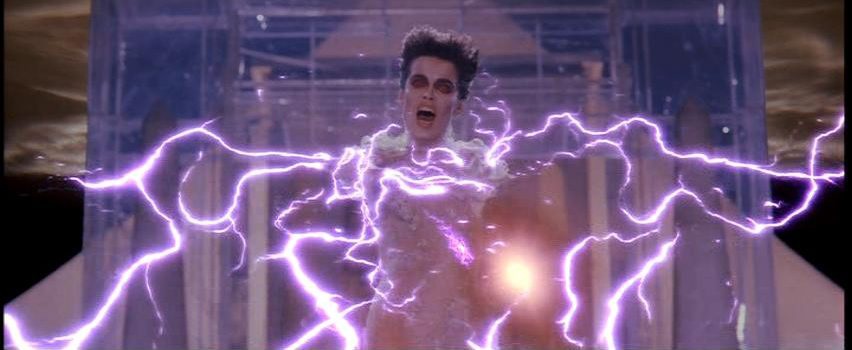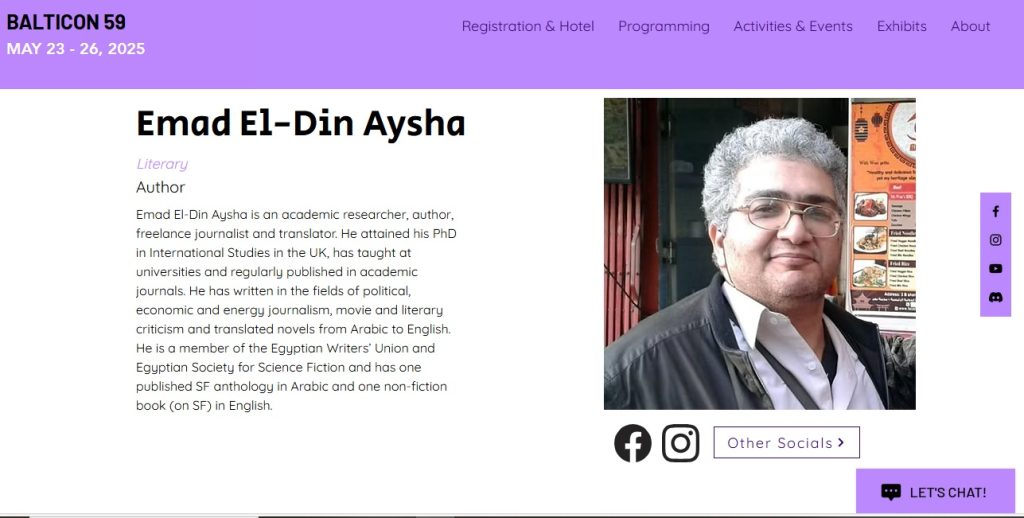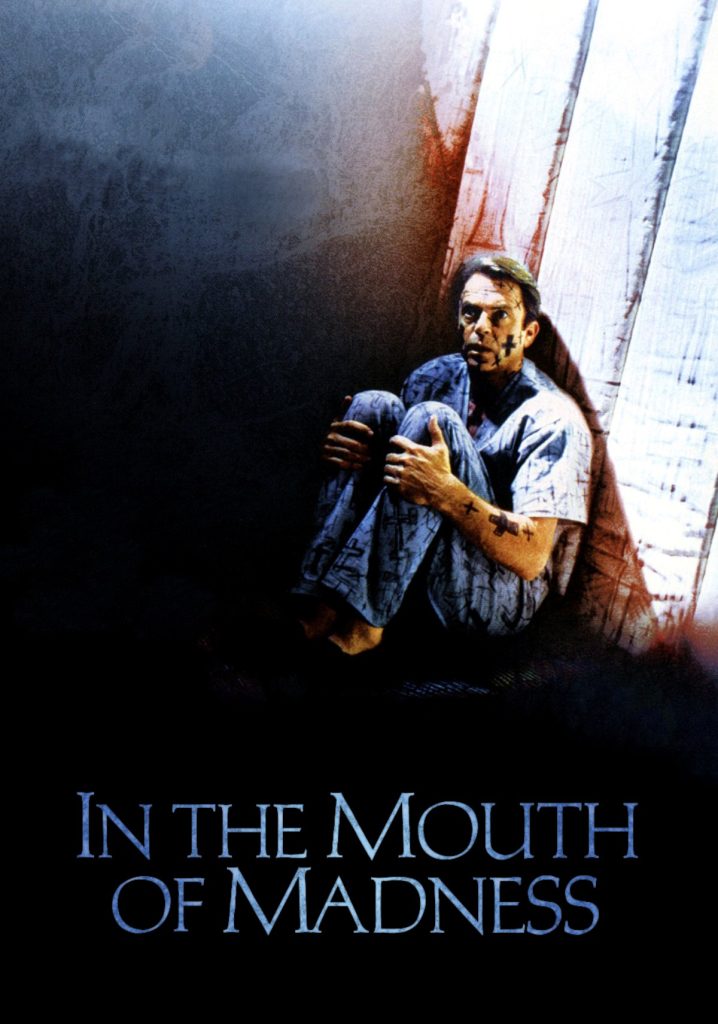
I had the good fortune of participating in Balticon 59 and took the opportunity to mention The Forbidden Land (2022) by Salah Zaki, a relatively uneventful novel about parallel universes and dimensions. Why has this subgenre become so popular in Egyptian SF?
By Emad Aysha
The quick answer is a kind of benign escapism. The story is about an Egyptian computer programmer working a dead-end job in electric power generation who gets zapped into another part of the universe by a portal that opens up during a giant thunderstorm.
He finds himself on another planet, slap-dab in the forbidden zone, and needless to say, gets arrested and tortured by the goons of the evil king who rules this world with an iron fist, making sure that people are so illiterate and ignorant they don’t even know what year it is.
The resistance rescues the guy, and he finds that everyone speaks Arabic, but they have no idea what language they’re talking, have never heard of God, and have no idea why the forbidden zone is forbidden. The man then becomes a highly sought-after commodity.
It’s not just his scientific skills, but that he’s a believer who can help give them hope and the promise of salvation, and also that he feels himself to be a man when he finds a damsel in distress who lost her parents to the evil king.
Half of the novel consists of him complaining about his dictatorial boss at work, his dictatorial dad from his childhood, and, most of all, his dictatorial ex-wife, who never needed him and is now getting along fine without him.
Everybody needs a purpose, and that purpose, more often than not (in the case of us dudes), is embodied in the form of a woman. He rises to the occasion, enjoying the sense of duty and responsibility, only to get outsmarted and caught by the king’s posse.
Then he’s put in charge, by the kind himself, of figuring out the secret of the accursed forbidden zone. It turns out that even the self-imposed ignorance policy has gotten the better of the ruling elites themselves!
The secrets lay in a pyramid, no surprise there, and the hero’s computer skills help him unlock the software codes where the secret history of this world is stored. These people date back to an ancient civilisation that existed during the age of the dinosaurs, but the evil tyrant of the time sought more power. Consequently, his scientists devised weapons of mass destruction.
Something went wrong, typically, and it killed most life on the planet. They hid themselves in a bunker and searched for a new planet to colonise, and an accidental discovery of wormholes got them there.
These ancients believed in God, but they hid the knowledge to control the masses, and even some of the resistance knew this secret too, but kept quiet so as not to cause religious wars between the populace. However, the policy of ignorance ultimately harmed everyone, including the ruling elite.
Hmmm. Well, I’d read an uneventful novella before this where someone is again catapulted into an alternate world that resembles Earth, and finds that he now has superpowers which he can use to deflect an alien invasion.
Sci-fi is so empowering, and a sea-change seems to be happening before our very eyes. When I taught at university, one story I used for essay and PowerPoint assignments was Stephen King’s “Word Processor of the Gods” (1983), and the girls hated it!

PROOF IN THE PUDDING: I had three panels, this one entitled “Alternate Realities and Parallel Universes”, with Evelyn Lewis as moderator, and Oghenechovwe Donald Ekpeki and Valerie Estelle Frankel as fellow panelists (23 May 2025). [Photo credits: Emad El-Din Aysha | Balticon 59]
Boys, by contrast, loved it. No surprise there, given that the story is about a struggling writer gifted a magical word-processor built by his deceased nephew, a sweet boy who wanted his uncle to rescue him from the abusive father who got him killed.
The so-called protagonist types something in, and it comes true. In his case, erasing his manipulative wife and obnoxious son, then replacing them with the nephew and the boy’s mother, his longtime secret crush.
That’s what we guys all want, to right past wrongs. Girls in our part of the world are brought up to be fatalistic and so naturally rebel against this kind of thing, literally saying in their essays that happiness comes from acceptance and appreciating what God gave them.
But here’s the rub. Salah Zaki is a devout individual, yet he doesn’t baulk at the prospect of changing history. He sees that as his duty. Religious authorities in Egypt would no doubt support my students, the girls, and forbid these kinds of devilish speculations.
Something is changing in the country's religious and cultural zeitgeist, and science and technology are seeping into the collective subconscious of the land. You can think up solutions to problems and not resort to magic or superstition as the only way to change your fate, so to speak.
The protagonist also learns to appreciate the disappointments in his life, as his knowledge of power generation helps him evade the security forces of a similar kind, setting a trap that he wouldn’t have learned were it not for nepotism in the workplace.
No defiance of religion, in other words. He also learns to blame himself for being passive in the past, a moral lesson reminiscent of what we saw in the fairytale TV series Gat Salima, starring the adorable Donia Samir Ghanem.
It’s also interesting that the hero, after defeating the king, contents himself with marrying his sweetheart, leaving the original leader of the resistance to become the new king. This is not the White Saviour, thank heavens.

INDULGENCE IS MY NAME: Sam Neil in a lunatic asylum after a hack horror writer uses Lovecraftian gods to take over the world, just to make his literary agent a puppet on a string. Total 'disempowerment' if you ask me.
More like the Egyptian sidekick. It’s predictable and cheesy, but I did like the globe-spanning ancient lost civilisation angel, with no aliens and no Egyptians secretly ruling the world.
It’s Lovecraft without Lovecraft, with the one true God asserting himself, in contrast to a movie like John Carpenter’s In the Mouth of Madness (1994).
That’s another fascinating subgenre in the offing for you!






